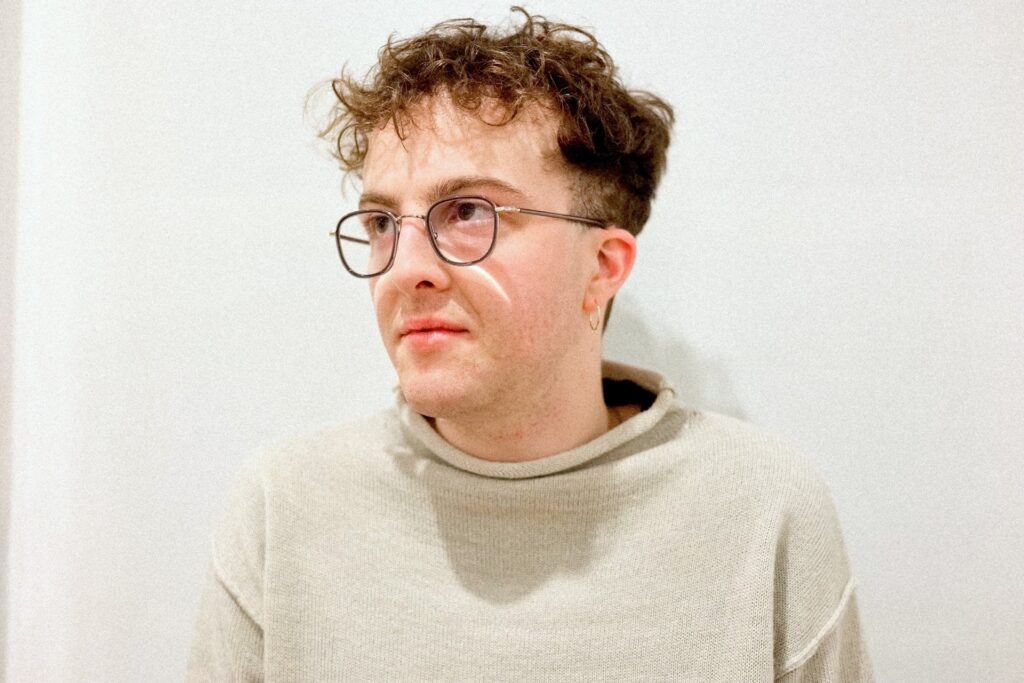Featured image: Tom Branfoot
Our new Graduate Stories series uncovers the diverse experiences of Manchester Met alumni, exploring the reality of life after graduation and highlighting career achievements. We shed light on the different paths graduates take, share relatable and honest advice, and provide practical tips for students who may feel uncertain about their next steps.
Tom Branfoot, 25, graduated with a degree in English and American Literature in 2021. He is currently a Writer in Residence at Manchester Cathedral and works with community charity Volition. He is also the Founder of poetry reading series, More Song which features open mic performers and invited guests from the world of poetry.
Tom walks us through his passion for poetry, his former university, and the impact he’s making on communities in the city.
Can you tell us what inspired you to create the More Song series?
I lived in London and Manchester and there’s a lot of poetry events that go on in these cities. After university, I moved back home to Bradford and there was just nothing going on. I thought, ‘I’ll just start something, and see what happens.’ I came up with the idea for More Song, which is essentially a monthly poetry reading series, and we focus on innovative experimental poetry.
People from marginal backgrounds and a lot of working-class and queer voices come to read at More Song, which is great. I love hosting the events. It’s been running for a year now and I really did not expect that.
Can you tell us about the relationship between Manchester Met and Manchester Cathedral?
My [Writer in Residence] Cathedral role was advertised as a post in tandem with Manchester Met and therefore I’ve been working with author and lecturer Andrew McMillan a little bit, putting on events here.
We recently did a ‘Christianity in Poetry’ event with Camille Ralphs, Michael Symmons Roberts and Malika Booker. I’m meeting with Andrew again soon to talk about continuing that into a series. It’s really nice to keep working with the university because I think MMU is great.
What are some of your career highlights so far?
Winning the New Poet’s Prize in 2022 was definitely a highlight as you get to support putting a pamphlet together and it is a well-regarded prize for young poets.
Can you tell us a bit more about the Cathedral’s sister charity, Volition?
They offer a lot of different kinds of artistic and creative ventures as part of the programme [helping people get back into work]. They do beekeeping, for example. Now they do poetry, so I’m teaching workshops every week.”
What are the benefits of studying at Manchester Met?
It’s skills like critical thinking, analytical skills, being able to closely read a text, being able to apply critical frameworks and being furnished with these skills that have helped me. And a lot of them are absent in public life these days. To have that opportunity continuously for three years is just a phenomenal opportunity.
Do you have any advice you can offer to final year students?
Enjoy summer because it’s potentially the last free summer you’ll have! If you enjoy writing essays and thinking critically about texts, approach journals and magazines to do book reviews. I got into reviewing a couple of years ago and it’s great because you get some publishing under your belt, you get paid and you get free books.
Going into postgraduate study is also a great option if you want to continue in education. It’s important to be sure that you want to commit to a masters as you will only get the chance to apply for one government-funded postgraduate degree.
For support, workshops and mentoring, check out the publisher and writer development agency, The Poetry Business, which published Tom’s pamphlet manuscript, This Is Not an Epiphany.






Leave a reply